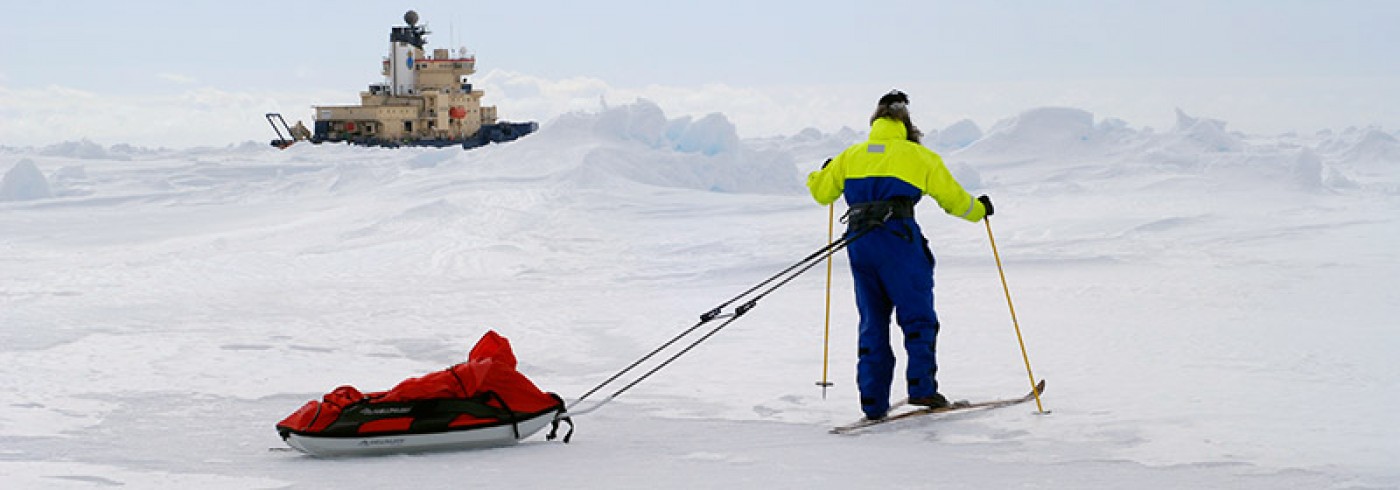The Swedish scientific party on Oden was devoted to studies of oceanography, the biology and chemistry of sea ice and water, the dynamics and evolution of epidemic diseases in seals, and benthic communities. The Swedes on the Palmer team studied the role of bacteria in the carbon cycle, crab predators invading warming Antarctic waters, as well as iodine, iron, and other tracers and their roles in the Amundsen Sea Polynya.
Inaccessible locations
Oden left Punta Arenas, Chile, on 8 December 2010 and reached McMurdo Station in the Ross Sea on 16 January 2011. We met R/V Nathaniel B. Palmer in the Amundsen Sea, where stations were occupied, as well as along a transect towards McMurdo, where three stations were located in the fast ice in the Ross Sea (i.e., Costa Rupert, Bay of Whales, and McMurdo Sound). The total science time was 20 days. During the course of the cruise, ice stations were occupied for ten 6–8-hour and three 24-hour periods. At 33 CTD stations, the water column was sampled for the analysis of chemical properties. The positions of the stations at the start of the science times were governed by the rendezvous with R/V Nathaniel B. Palmer and the position of the mooring site. In addition, a benthic camera mounted on a sledge was deployed on five occasions. We were fortunate to have a helicopter aboard Oden, which allowed the sampling of seals nearly every day.
Icebreaking mission
The vessels cooperated on both navigation and research as they sailed towards the American McMurdo Research Station, where the expedition concluded. A helicopter was on board Oden for both navigational and research purposes. Once the expedition ended, Oden set off to break an ice channel in McMurdo Sound on behalf of the National Science Foundation. This mission made it possible to travel to and from the American station by boat during the research season.
Research on board the icebreaker Oden
- Inter-Related Biogeochemical Cycles of Halocarbons and Mercury in the Southern Ocean
Katarina Abrahamsson, Department of Chemistry, University of Gothenburg - Circulation of Warm Oceanic Water and Glacier Melt Water in the Amundsen Sea–Ross Sea shelf Region
Göran Björk, Department of Earth Sciences, University of Gothenburg - Dynamics and Evolution of Epidemic Diseases in Antarctic and Arctic Seals
Tero Härkönen, The Department of Contaminant Research, Swedish Museum of Natural History - Processes Driving the CO2 System in Sea Ice and Water in the Climatically Sensitive Amundsen and Ross Seas
Melissa Chierici, Department of Chemistry, University of Gothenburg
Research on board Nathaniel B. Palmer
- Iodine Isotopes (129I and 127I) and Species (I- and IO3-) as Ultra Sensitive Tracers of Ocean Circulation
Ala Aldahan, Department of Earth Sciences, Uppsala University - Patchiness and Significance of Microbial Communities Controlling the Southern Ocean Carbon Cycle
Stefan Bertilsson, Department of Ecology and Evolution, Uppsala University - Climate Change and Predatory Invasion of the Antarctic Marine Environment
Per-Olav Moksnes, Department of Marine Ecology, University of Gothenburg - Iron Speciation and Lead in Amundsen Sea: Study of the Relative Importance of Sea and Glacial Ice Sources
Kuria Ndungu, Department of Applied Environmental Science (ITM), Stockholm University
Rebecca Dickhut: 31 July 1960–4 November 2011
Rebecca Dickhut participated in two of five Oden Southern Ocean expeditions, in 2011 as co-chief scientist.
Her research was devoted to the air–water exchange of organo-chlorine pesticides (POPS) and the transport and fate of organic pollutants in Antarctica.
Rebecca loved Antarctica, so some of her ashes were spread in its waters by her colleagues. Not only did she love Antarctica, she also loved to be aboard the Oden with us and the crew – she often referred to herself as “half Swede”. She was a devoted scientist with a personality that lit up the cruises. As co-chief scientist, she was a focused and true enthusiast. Together, we found a fantastic site for scientific work and perhaps one of the most beautiful places in Antarctica, Costa Rupert. Before we left McMurdo Station, Rebecca was in her mind already back on Oden, ready for a new expedition to Costa Rupert.
She was a good friend and fellow scientist, and she is missed by all of us.

